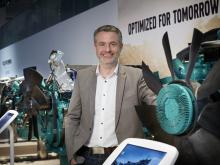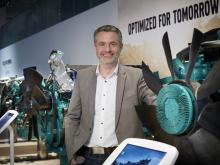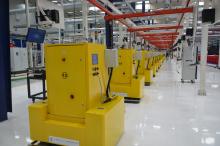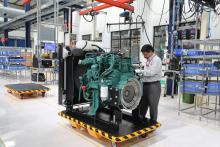Björn Ingemanson, who has been at the helm of Volvo Penta for over a year, says the company has what it takes to become a bigger player in the off-road business.
“Volvo diesel power gives a competitive edge to the group’s construction equipment and trucks. Our job is to bring the same competitive edge to OEM customers in the external engine business,” says Ingemanson, who was appointed president of
He has a long history at the Volvo Group and his past positions include chief financial officer of Volvo Trucks and European head of the group’s customer financing company, Volvo Financial Services.
Following a reorganisation, Volvo Penta remained a business area in the Volvo Group, with responsibility for development and sales of engines and drive systems for marine and industrial applications.
“With a world-class offering, both in terms of products and aftermarket support, we are ready to take the next step,” says Ingemanson, who since taking up the reins of the company has been coming to grips with the challenges and opportunities facing the Volvo Group’s company for loose engine sales.
After concluding that opportunities to develop the brand are plentiful, he has set Volvo Penta on an ambitious growth strategy. Capturing new OEM customers in material handling, construction and raw material exploration has been identified as the best way to grow the off-road business.
“A century of success in the marine business has taught us how to create the conditions for long-term relationships with world-leading OEM customers where we prove ourselves as a credible and trustworthy partner, one that offers world-class quality, fuel efficiency and global support,” says Ingemanson.
“This is a strong foundation for establishing the same relationship with OEM customers in the industrial engine business.”
The company says that where once marine engines dominated sales, now turnover is split equally between marine and industrial engines. The marine business will continue to be important, but since Volvo Penta’s market share in this segment is already strong, expanding it further will be a challenge.
This isn’t the Case with the industrial off-road segment, where Volvo Penta has a smaller share of the market, but with a new product range and Volvo Group’s global aftermarket offering it says it has a good opportunity to grow its slice of the cake, whatever the prevailing economic conditions.
“We should not be deterred by market conditions. Even in tough times we can deliver good results, and in recent years our profit margins have been among the best in the Volvo Group. This strong ‘bottom line’ will provide tremendous leverage as we grow,” says Ingemanson.
One of the areas set to change most radically is Volvo Penta’s distribution network where the company says it will increasingly be able to leverage the considerable distribution of Volvo Construction Equipment’s dealer network.
“Forging a closer relationship with Volvo Construction Equipment doesn’t just help us with distribution. We can also take advantage of its customer base, as there is a good deal of crossover for our industrial offerings.”
Ingemanson points out that Volvo Penta is in a strong position in certain industrial segments, such as power generation and material handling.
“We have some big-name customers and excellent products that are fuel-efficient, reliable and that utilise advanced technology.
“If we can continue to build upon our reputation for innovative, high-quality products and support these products in the aftermarket with spare parts and service expertise, then we will be able to compete against anyone.”









